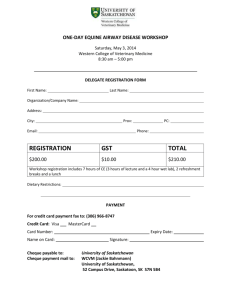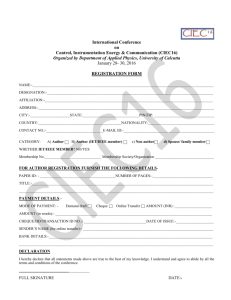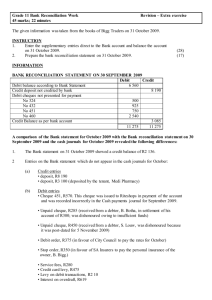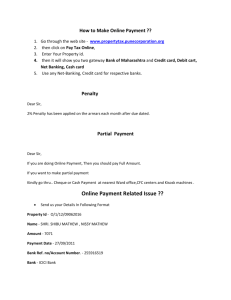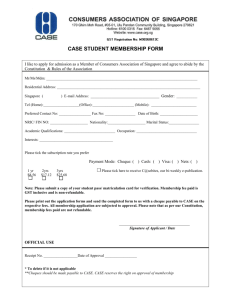Article 1 The General Banking Conditions (GBC) contain rules for all
advertisement
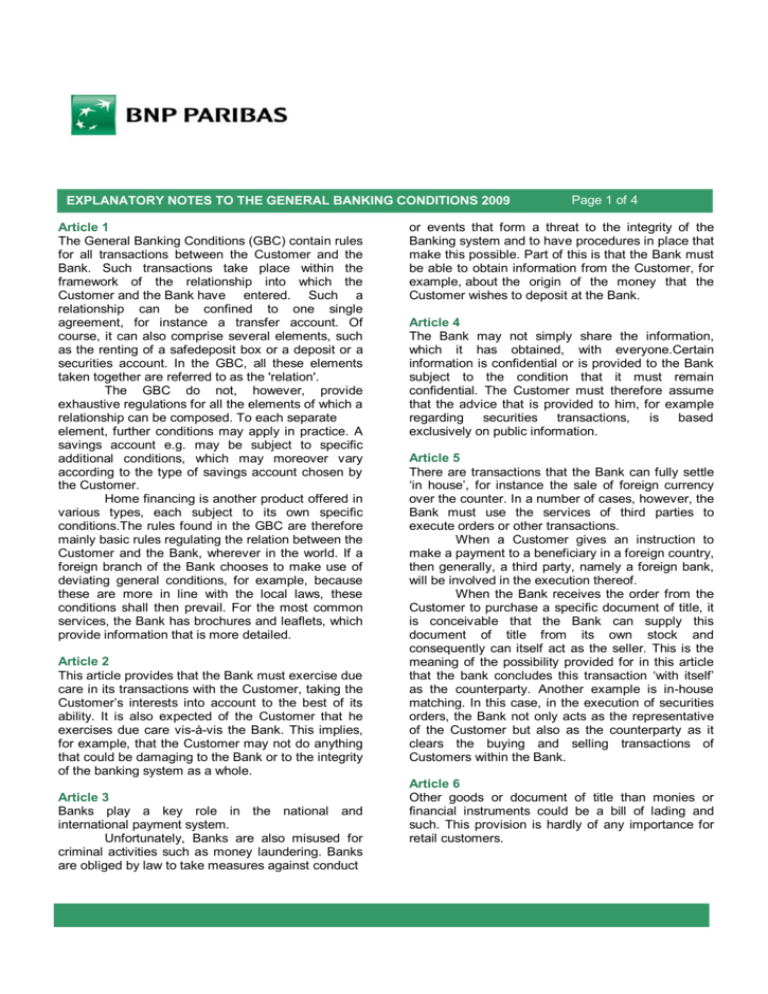
Page 1 of 4 Article 1 The General Banking Conditions (GBC) contain rules for all transactions between the Customer and the Bank. Such transactions take place within the framework of the relationship into which the Customer and the Bank have entered. Such a relationship can be confined to one single agreement, for instance a transfer account. Of course, it can also comprise several elements, such as the renting of a safedeposit box or a deposit or a securities account. In the GBC, all these elements taken together are referred to as the 'relation'. The GBC do not, however, provide exhaustive regulations for all the elements of which a relationship can be composed. To each separate element, further conditions may apply in practice. A savings account e.g. may be subject to specific additional conditions, which may moreover vary according to the type of savings account chosen by the Customer. Home financing is another product offered in various types, each subject to its own specific conditions.The rules found in the GBC are therefore mainly basic rules regulating the relation between the Customer and the Bank, wherever in the world. If a foreign branch of the Bank chooses to make use of deviating general conditions, for example, because these are more in line with the local laws, these conditions shall then prevail. For the most common services, the Bank has brochures and leaflets, which provide information that is more detailed. Article 2 This article provides that the Bank must exercise due care in its transactions with the Customer, taking the Customer’s interests into account to the best of its ability. It is also expected of the Customer that he exercises due care vis-à-vis the Bank. This implies, for example, that the Customer may not do anything that could be damaging to the Bank or to the integrity of the banking system as a whole. Article 3 Banks play a key role in the national and international payment system. Unfortunately, Banks are also misused for criminal activities such as money laundering. Banks are obliged by law to take measures against conduct or events that form a threat to the integrity of the Banking system and to have procedures in place that make this possible. Part of this is that the Bank must be able to obtain information from the Customer, for example, about the origin of the money that the Customer wishes to deposit at the Bank. Article 4 The Bank may not simply share the information, which it has obtained, with everyone.Certain information is confidential or is provided to the Bank subject to the condition that it must remain confidential. The Customer must therefore assume that the advice that is provided to him, for example regarding securities transactions, is based exclusively on public information. Article 5 There are transactions that the Bank can fully settle ‘in house’, for instance the sale of foreign currency over the counter. In a number of cases, however, the Bank must use the services of third parties to execute orders or other transactions. When a Customer gives an instruction to make a payment to a beneficiary in a foreign country, then generally, a third party, namely a foreign bank, will be involved in the execution thereof. When the Bank receives the order from the Customer to purchase a specific document of title, it is conceivable that the Bank can supply this document of title from its own stock and consequently can itself act as the seller. This is the meaning of the possibility provided for in this article that the bank concludes this transaction ‘with itself’ as the counterparty. Another example is in-house matching. In this case, in the execution of securities orders, the Bank not only acts as the representative of the Customer but also as the counterparty as it clears the buying and selling transactions of Customers within the Bank. Article 6 Other goods or document of title than monies or financial instruments could be a bill of lading and such. This provision is hardly of any importance for retail customers. Page 2 of 4 Article 7 The obligation to provide insight into the ownership and control structure of a legal person or form of cooperation at the Bank’s first request follows from the same laws as referred to in article 3. Article 9 An example of a public register as referred to in this article is the commercial register of the Chamber of Commerce and Industries. If the Customer has an enterprise, this enterprise will, as a rule, be registered in the commercial register. In this situation, the Customer – for example when opening the account – may have submitted an extract from the commercial register to the Bank, showing that he has granted a power of attorney (signatory power) to an employee and that under this power of attorney the employee has the power to sign for the bank account. If, at a given moment, the Customer revokes this power and notifies the commercial register thereof but not the Bank, this article provides that this revocation shall not become operative vis-à-vis the Bank, until the Bank has been notified in writing of the said revocation. Article 10 The manner in which the Bank treats the personal data of the Customer is regulated in the Code of Conduct for Processing Personal Data by Financial Institutions (Gedragscode Verwerking Persoonsgegevens Financiele Instellingen). This Code of Conduct has been approved by the Dutch Data Protection Authority (College Bescherming Persoonsgegevens) and can be obtained from your Bank upon request. Article 13 In the event of the death of a Customer, the Bank generally does not know who the legal successors are. In order to prevent the estate from passing into the wrong hands, the Bank demands an attestation of admissibility to the estate. If the bank has obtained certainty in another manner regarding the legal successors, the Bank can decide not to request such an attestation. However, the Bank is not obliged to do this. of 4 Article 18 The so-called records provision has been dealt with extensively when the new Dutch Civil Code was drafted and accepted as a practical formula. Decisive in this process is that banks are subject to supervision and are obliged to maintain sound and reliable records. Of course, the Customer is free to submit evidence to the contrary. Article 19 When the Customer finds that orders that he has given to the Bank have not been executed or have not been executed correctly, he must lodge a complaint with the Bank as soon as possible. For though it is true that the bank is liable for its own mistakes, a timely complaint may help to keep the damage, if any, within reasonable limits. Moreover, the following is true:The earlier the complaint, the greater the possibility of reconstruction and rectification. Article 20 The contents of confirmations, etc. sent by the Bank to the Customer shall in any case be deemed to have been approved by the Customer if he has not objected to them within a period of thirteen months. However, this period does not apply where it concerns arithmetical errors made by the Bank. Article 21 If forms, bank cards and the like are lost by the Customer or if they are there is of course the risk that the finder or the thief will make improper use of the things he has found or stolen. However, the Customer can limit the consequences of such misuse by informing the Bank as soon as he has discovered the loss or theft. Article 22 In addition to debit and credit interest, the Customer may also be faced with commissions and fees, since the Bank may charge the Customer a commission or fee for its services. The Bank has laid down standard charges for a large number of services. Information on such charges is available at the Bank’s offices. Page 3 of 4 Article 23 It may happen that the Customer receives a cheque from a party in a foreign country. Of course, the Customer wishes to collect the amount of this cheque and for this purpose hands the cheque to his own bank. The Bank will credit the Customer’s account with the amount of this cheque after the amount has been collected. Sometimes, the Bank is willing to credit the Customer’s account with the amount of the cheque in anticipation of the actual collection. In this case, the credit entry will be made subject to the proviso that subsequently the Bank will in fact receive the amount of this cheque. If this is not the case – for it does happen that cheques are returned unpaid then the Bank is authorised to debit the Customer's account again. In banking terminology this is known as ‘credit entry under usual reserve’, which in Dutch is often abbreviated as ‘credit entry o.g.v.’ Article 24 Lending is one of the principle activities of the Bank. The loans are often secured. For example, loans may be provided against collateral in the form of securities. In this case, the Bank has a lien on the Customer’s securities deposit with the Bank. Article 24 deals with this kind of lien. A special feature of this lien is that it is created ‘automatically’, which means that the Customer does not have to execute separate instruments of pledge each time. Another advantage of the flexibility resulting from this arrangement is that it is also conductive to the smooth processing of payment orders. Article 25 Kindred to the right of lien is the Bank’s right of setoff. This right has a wider scope than the statutory right of set-off because it includes the possibility of setting off debts, which are not yet due and payable. The Bank will only use this wider right of setoff in connection with debts expressed in the same currency and if one of the events stated in this article occur. In practice, the most important event on the list is the situation that a creditor of the Customer levies an attachment upon the Customer’s account at the Bank. Article 26 As has been said above, loans are often granted against security. Now it is conceivable that the security, which originally was adequate subsequently, becomes or threatens to become inadequate. This may happen, for instance, when the prices of the securities covered by the Bank's lien fall. Pursuant to article 26, the Bank may in such case demand that the Customer provide additional security. The Bank may also demand that security be provided for an entirely unsecured debit position or a debit position that is insufficiently secured in the opinion of the Bank. In short: the Customer must ensure at all times that the amounts he owes to the bank are secured by sufficient security. Article 27 If the Customer fails to perform any of his obligations towards the Bank, the Bank will, of course, consider its total position vis-à-vis the Customer. The Bank may find itself compelled to actually demand payment of all of its out standing debts. The Bank will not do so until after it has given the Customer prior written notice stating the reason why it is calling its debts. Article 28 When there is a dispute between the Customer and third parties, the costs incurred by the Bank shall be entirely for the Customer’s account, since the Bank is not in fact a party to such dispute. A situation like this may occur, for instance, when one of the Customer’s creditors levies an attachment on the Customer’s account with the Bank. Article 30 More and more often, a different manner of communication is agreed with the bank than in writing. This is the case, for example, for online banking. Article 34 When a consumer has a dispute with the Bank, he may submit the dispute to the competent Dutch Court; however, he may also apply to the Committee of Good Offices Financial Services (Klachteninstituut Financiele Dienstverlening (KiFiD)). Information on the procedure that is to be followed is available at the Bank. Page 4 of 4 Article 37 It may prove to be desirable in the future - for instance due to newtechnical or other developments - to amend or add to the GBC. Article 37 specifies the manner in which amendments and additions will become binding. In this case, the consultation procedure for consumers’ and employers’ organisations is important, since amendments and additions will not take effect until after these organisations have been consulted.

